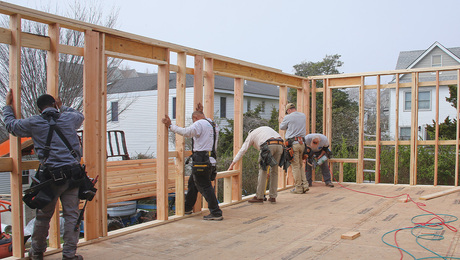After sweating copper lines to a new bathroom, I hooked up an air test gauge. Found a couple of easy leaks and repaired them, but can no longer get any soap bubbles anywhere, yet the pressure slowly drops from 25psi. Maybe 5 pounds per hour.
The system currently “ends” with 5 valves; 2 for the washer, 2 for the hot/hot return, and 1 for the cold supply. Each of these will eventually be connected, but before I tie it in and make it wet, (and any repairs much harder to make) I’d like to know if it’s likely that these valves are the source of the air pressure drop. If so, I’ll quit worrying, but otherwise…?
Thanks for any opinions or advice,
David



















Replies
DSorg,
Water valves probably won't hold air. If you have soap tested all new work, you're probably ok. But don't hold me responsible for any future leaks.
Remodel work is always suspect till it's been wet for a few days (weeks, months.)
Make it wet before you cover it up.
SamT
Did you soap the valves?
The only valves we are required to put in for the rough-in test are the pressure balancing valves for shower/baths that will be hidden in the walls once the dw is up. Everything else is just stubed out and capped. We are required to hold working pressure (60-65 lbs.) for 24 hours. If it doesn't hold, there is a slow leak.
I find that using a leak detecting liquid formulated for air cinditioning systems is a lot better the the old dish washing liquid and water. The product I use is called Big Blue, and will make real big bubbles at the smallest of leaks, no matter how slow.
Another trick is to over charge the systen by 25 to 35 lbs, and soap everything at the higher pressure (80-100 psi guage). Be carefull that any valvels you have are rated for the higher test pressure or you damage them.
Hope this helps.
Dave
If you "found a couple of easy leaks.".whats a couple? 2..4..? I would wet it at pressure , then a couple of hard leaks will become "easy". You can still right them after it gets wet..just gotta be more diligent in your soldering skills. That is the best test.
At least here in California, Dave is right on. We pressurize the system with all valves closed at 65 lbs and it must hold that pressure for 24 hours. If not, you have a leak. It would not pass Code here. Find your leak.
Regards,
Boris
"Sir, I may be drunk, but you're crazy, and I'll be sober tomorrow" -- WC Fields, "Its a Gift" 1934
Did you soap the valve stem in the air guage? They're notorious for leaking themselves.
Good point Bob. Another place are the threads on the gauge manifold.
Dave
And the test gauge itself. Has a little bicycle/car tire air valve? Soap the sucker and check. I've seen them leak.David Thomas Overlooking Cook Inlet in Kenai, Alaska
squirt a can of "fix a flat" in there..just don't go over 50 mph and 50 miles..and apply sticker warning it is in there..
Thanks guys, it DOES appear to be the guage itself, though I'm going to head out to find some of that Big Blue . All the pipe will remain exposed for at least a week after it's wet, too, so I can go looking for any wet spots.
What do I win? :-)